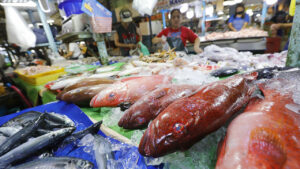Easing prices may spur BSP rate cuts
WASHINGTON, D.C. — The Philippine central bank may cut the key policy rate this year if inflation continues to ease in the next six months, according to its chief.

By Keisha B. Ta-asan, Reporter
WASHINGTON, D.C. — The Philippine central bank may cut the key policy rate this year if inflation continues to ease in the next six months, according to its chief.
“We already have two very low month-on-month [inflation],” BSP Governor Felipe M. Medalla told reporters on the sidelines of an economic briefing in Washington D.C. on Wednesday evening (Manila time). “If that continues, then there’s a reason to pause.”
“If April has a similar pattern, then we have four more of that, five more of that, we can even talk about cuts,” he said. If inflation eases month on month by 0.2 point in the next six months, “why not?”
Inflation slowed for a second month to 7.6% in March from 8.6% in February, the slowest in six months. It averaged 8.3% in the first quarter, higher than the central bank’s full-year forecast of 6% and its 2-4% target.
“We will need more good data points for cuts,” Mr. Medalla said. “For a pause, just one more [month], because we already have two very good data points.”
The Monetary Board has raised borrowing costs by 425 bps since May last year — including the 25-basis-point hike last month — bringing the benchmark rate to 6.25%, the highest since 2007.
At the economic briefing, Mr. Medalla said the Bangko Sentral ng Pilipinas (BSP) would revise its inflation projections this year to less than 6%.
“The main reason for the revision is that the most recent inflation number from March is at the low end of the forecast range. That affects the forecast,” he said.
The 7.6% inflation in March was within the BSP’s 7.4-8.2% forecast. The central bank expects full-year inflation to average 6% this year before easing to 2.9% next year.
But rising global oil prices could still affect the country’s inflation, Mr. Medalla said.
Global oil prices spiked earlier this month after the Organization of the Petroleum Exporting Countries and their allies including Russia announced further output cuts of about 1.16 million barrels per day from May through the rest of the year.
Meanwhile, Mr. Medalla said he is not worried about the effects of the African Swine Fever (ASF) because it should soon wane.
The infectious hog disease has been affecting 21 provinces, 54 towns and cities and 137 villages in the Philippines, according to the Bureau of Animal Industry.
Last month, the bureau confirmed an outbreak in Cebu after 58 of 149 blood samples taken from hogs in Carcar City were found infected.
The flu was first detected in the Philippines in 2019, leading to the culling of thousands of pigs and prompting the government to boost meat imports.
FOOD SHORTAGES
The BSP might cut policy rates by the fourth quarter to support economic growth, said Domini S. Velasquez, chief economist at China Banking Corp.
“Inflation for 2024 looks to be firmly within target and the BSP can already start cutting rates by the end of the year to support economic growth; especially since we expect the gross domestic product to moderate this year and next year,” she said in a Viber message.
The government is targeting 6-7% growth for this year, slower than 7.6% in 2022.
But low month-on-month inflation will have to come from nonmonetary interventions, Ms. Velasquez said. “We’re seeing risks that need to be addressed proactively such as seeming food shortages again (garlic, onion) and the impact of the ASF. A lot relies on initiatives of the new interagency committee on inflation and market outlook.”
President Ferdinand R. Marcos, Jr. last month formed a committee on inflation that would ensure food and energy security. The body is co-headed by the chiefs of the National Economic and Development Authority and the Department of Finance.
The central bank has room to pause the rate increase at their May meeting, said Nicholas Antonio T. Mapa, senior economist at ING Bank N.V. in Manila.
“The delayed impact of previous tightening has yet to filter through to the rest of the economy but already, we’ve seen its toll on bank lending, which has slowed considerably despite a solid economic growth momentum,” he said in an e-mail.
Bank lending slowed for a third straight month in February as outstanding loans by big banks eased by 10% to P10.69 trillion from a month earlier. It was also the slowest credit growth in 11 months.
The central bank must ensure that inflation slows to its 2-4% target and inflation expectations are controlled before they consider easing policy, Mr. Mapa said.
“Stringing together six straight months of low month-on-month inflation could be possible although we do recognize that supply side issues remain very apparent, such as the resurgence of the African Swine Fever and storms,” he said.
“The BSP will thus likely be looking at the type of inflationary pressures, making sure to distinguish between cost push and supply-side pressures, while also ensuring that inflation expectations are reanchored,” he added.
The local statistics agency will release April inflation data on May 5. The Monetary Board will meet on May 18 to discuss policy.













